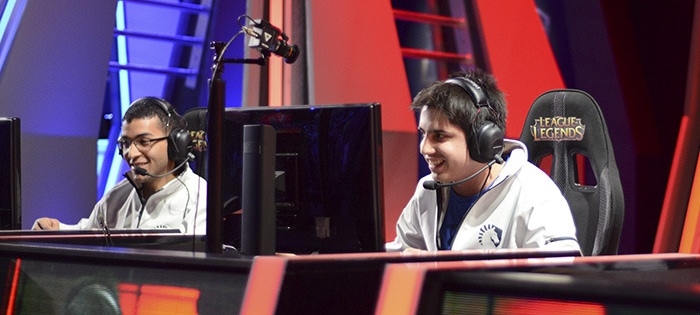The Performance Series: Teamwork & Communication
Previously we took a deep dive highlighting the level of focus that gamers need to perform on match day. Another factor that is vital to gaming success is communication and teamwork. Just like in traditional sports, team chemistry affects competitive and casual matches alike, oftentimes being the single most important deciding factor between the winning team and their losing foes.
In League of Legends, a five versus five multiplayer online battle arena game, teammates are constantly strategizing — both through microphones and type — in order to destroy the opponents nexus, or home base.
This communication is most evident in the highest level of League of Legends play in America, the North American League Championship Series (LCS). Games in the professional league are very competitive and extremely intense. Good teamwork and communication are vital in order for players to execute their strategy and thus players must be extremely familiar with their teammates to achieve such levels of cohesion.
That is why most professional gaming squads live together in a gaming house. One such team is Team Liquid. The 3-3 LCS team, formerly named Team Curse, got off to a flying start in week 1 — winning both of their games — but were unable to maintain their momentum dropping both week 2 matches and splitting their week 3 matches.
Diego “Quas” Ruiz, Top Laner for Team Liquid says that there are pros and cons to living in a team house, but “overall [it] helps with team chemistry”. That chemistry, “Quas” asserts, oftentimes makes the difference between a win and a loss.

Alex “Xpecial” Chu, Support for Team Liquid, agrees: “living in a gaming house definitely helps build team synergy and helps five random players become an actual team”. However, a lack of communication — even between teammates living together under one roof — can be very detrimental to a team’s performances.
Team Liquid completed a few high profile personnel changes this offseason, acquiring Korean players Chae “Piglet” Gwang-jin and Kim “FeniX” Jae-hoon. Both players speak relatively little English and the team’s ability to communicate, both on the Rift and outside of it, has suffered.
This lack of communication is one factor that may have contributed to Team Liquid’s performance so far in the LCS. Although many fans and analysts alike consider “Piglet” one of the best AD Carry’s in the world, Liquid are still acclimating to each other’s playing styles and miscommunications happen frequently.
“Xpecial” admits that his inability to speak to laning partner “Piglet” can be frustrating, but he assures that “refining our communication is our number one priority.”
Liquid’s success in the coming year will depend on their ability to sort out their communication issues. “Piglet” and “FeniX” are working with English teachers to learn the language and long practice days help the team members get familiar with each other’s play. Their story, however is telling of the importance of teamwork & communication in eSports, particularly in team games such as League of Legends.



